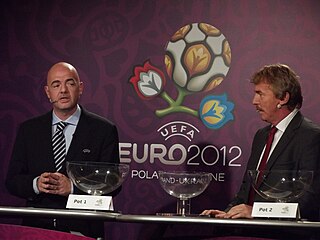In Group E of the UEFA Euro 2008 qualifying tournament, Croatia secured qualification to the finals on 17 November 2007 following Israel's 2–1 win against Russia, becoming the seventh team in the whole of the qualification stage to do so. Russia secured qualification to the tournament finals on 21 November 2007 following a 1–0 win against Andorra, and Croatia's 3–2 win against England, becoming the fourteenth and last team in the whole of the qualification stage to do so.

The 2010 FIFA World Cup qualification UEFA Group 5 was a UEFA qualifying group for the 2010 FIFA World Cup. The group comprised European champions Spain, Turkey, Belgium, Bosnia and Herzegovina, Armenia and Estonia.
The Elite Round of the 2009 UEFA European Under-19 Championship is the second round of qualification. The winners of each group join hosts Ukraine at the Final Tournament.
The 1992 season was the 72nd season of competitive football (soccer) in Estonia, and the first one in the Baltic country as an independent nation. The Estonia national football team under the guidance of manager Uno Piir played its first FIFA-recognized match after the restoration of independence against Slovenia on June 3, 1992: a 1-1 draw in the capital Tallinn. The team played a total number of five official matches in the year 1992, including two qualifiers for the 1994 FIFA World Cup in the United States.
The 2001 season marked the tenth year of competitive football in the Baltic country since its independence. The Estonia national football team played thirteen matches and ranked fourth place overall.
The 2002 season was the 11th full year of competitive football in the Baltic country as an independent nation. The Estonia national football team played a total number of eleven matches in 2002, and did not qualify for the 2002 FIFA World Cup in Japan and South Korea.
The 2003 season was the 12th full year of competitive football in the Baltic country as an independent nation. The Estonia national football team played a total number of seventeen international matches in 2003. The team ended up in fourth place in European Qualification Group 8 for Euro 2004, with two wins, two draws and four defeats.
The 2004 season was the 13th full year of competitive football in the Baltic country as an independent nation. The Estonia national football team played sixteen international matches in 2004.
The 2006 season was the fifteenth full year of competitive football in the Baltic country as an independent nation. The Estonia national football team played a total number of seven international matches in 2006 after not having qualified for the 2006 FIFA World Cup in Germany.
The 2007 season was the sixteenth full year of competitive football in the Baltic country as an independent nation. The Estonia national football team played a total number of fifteen matches in 2007 and did not qualify for Euro 2008 in Austria and Switzerland.
The 2008 season was the seventeenth full year of competitive football in the Baltic country as an independent nation. The Estonia national football team played a total number of fifteen matches in 2008 and started in the qualifying tournament for the 2010 FIFA World Cup in South Africa.
The 2011 FIFA Women's World Cup qualification UEFA Group 1 was a UEFA qualifying group for the 2011 FIFA Women's World Cup. The group comprised France, Iceland, Serbia, Northern Ireland, Croatia and Estonia. It was the only six-team group.

The UEFA Euro 2012 qualifying play-off ties were played over two legs, with the first legs on 11 November and the second legs on 15 November 2011. The four winners are found according to the standard rules for the knockout phase in European competitions, and the winners qualified for the Euro 2012 tournament. Qualifying play-offs was a second stage (round) of UEFA Euro 2012 qualifying.
The 2015 FIFA Women's World Cup qualification UEFA Group 2 was a UEFA qualifying group for the 2015 FIFA Women's World Cup. The group comprised Czech Republic, Estonia, Italy, Macedonia, Romania and Spain.
The UEFA Euro 2016 qualifying Group E was one of nine groups drawn to decide which teams would qualify for the UEFA Euro 2016 finals tournament. Group E consisted of six teams: England, Switzerland, Slovenia, Estonia, Lithuania, and San Marino, who played against each other home-and-away in a round-robin format.

This page shows the Kazakhstan national football team's results in International matches, as recognized by FIFA:

The 2018 FIFA World Cup qualification UEFA Group H was one of the nine UEFA groups for 2018 FIFA World Cup qualification. The group consisted of six teams: Belgium, Bosnia and Herzegovina, Greece, Estonia, Cyprus, and Gibraltar.
The 2018–19 UEFA Nations League C was the third division of the 2018–19 edition of the UEFA Nations League, the inaugural season of the international football competition involving the men's national teams of the 55 member associations of UEFA.
The 2020–21 UEFA Nations League C was the third division of the 2020–21 edition of the UEFA Nations League, the second season of the international football competition involving the men's national teams of the 55 member associations of UEFA.
The 2022 Baltic Cup was the 29th Baltic Cup, an international football tournament contested by the Baltic states. Iceland won their first title and was the first guest team in the tournament to win it.



